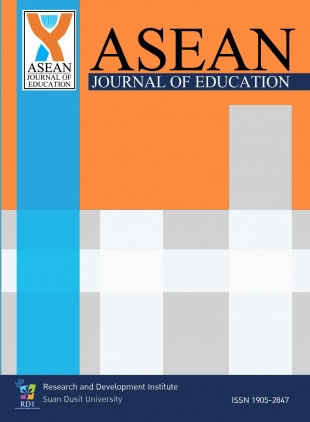Digital Classroom for Digital Native to Enhance Digital Literacy
Keywords:
Digital classroom, Digital native, Digital literacyAbstract
The objectives of this research consists of: 1) to study digital classroom for digital native to enhance digital literacy and 2) to study satisfaction of learning process through digital classroom. The sample included 59 undergraduate students of section D1 who registered in the Digital Literacy course of the 2019 academic year. The research instruments were the learning management plan for digital classroom management model, the digital literacy questionnaire and satisfaction with the learning management process questionnaire. Data were analyzed by using percentage, mean and standard deviation. The results of the study were as follows: 1) digital literacy was high level ( = 3.46, SD = 0.84) and can be sorted in ascending order as follows; information literacy ( = 3.59, SD = 0.86) media literacy ( = 3.54, SD = 0.93) and technology digital literacy ( = 3.49, SD =0.96) and 2) the satisfaction of learning process through digital classroom was at the highest level ( = 4.28, SD = 0.82)
References
Avvisati, F., Hennessy, S., Kozma, R. B., & Vincent-Lancrin, S. (n.d). Review of the Italian strategy for digital schools. Paris, France: Centre for Educational Research and Innovation, OECD Publishing.
Eshet-Alkalai, Y. (2004). Digital literacy: A conceptual framework for survival skills in the digital era. Journal of Educational Multimedia and Hypermedia. 13(1), 93-106.
European Commission. (2018). ICT in education: digital schools and classrooms. Retrieved 2018, May 19, From http://s3platform.jrc.ec.europa.eu/education.
Garavaglia, A., & Ferari, S. (2012). A model for defining digital classroom settings. Procedia-Social and Behavioral Sciences, 46(2012), 1983-1987.
Hobbs, R. (2010). Digital and media literacy: A plan of action. Washington, D.C.: The Aspen Institute Communications and Society Program.
International Federation of Library Associations and Institutions. (2015). IFLA school library guidelines. Retrieved 2017, 17 January, From https://creativecommons.org/licenses/by/3.0
Mashhadi, V. Z., & Kargozari, M. R. (2011). Influences of digital classrooms on education. Procedia Computer Sciences, 3(2011), 1178-1183.
Ministry of Digital Economy and Society. (2018). Strategic action plan 3 create a quality society that is equal to the digital technology. Retrieved 2018, 16 May From http://mdes.go.th//assets/portals/1/files/591208_ร่างแผน ปฏิบัติการยุทธศาสตร์ที่ 203.pdf
Netwong, T. (2019). The using of inquiry and creativity-based learning to effectiveness digital literacy of mainstreaming students, Library and Information Science Program. RMUTI JOURNAL Humanities and Social Sciences, 6(1), 83-97.
Office of the Civil Service Commission. (2017). Digital literacy. Retrieved 2018, 16 May From https://www.ocsc.go.th/DLProject/mean-dlp
Office of the Education Council. (2017). The national education plan of 207-2036. Bangkok: Office of the Education Council, Ministry of Education.
Ontario School Library Association. (2010). Together for Learning: School libraries and the emergence of the learning commons. Ontario, U.S.A: Ontario School Library Association, Ontario’s Ministry of Education.
Parameswari, M., & Priya, S. (2016). Survival skills in digital era. An International Journal of Interdisciplinary Studies, Special Issue(1), 1-5.
Phosaard, S. (2016). Grand challenges in digital university. Suranaree Journal of Social Science, 10(2), 171-188.
Rakhmawati, D. E., & Kusuma, A. W. (2015). Digital native: A study on the first – year student. LiNGUA, 10(2), 82-87.
Reaves, J. (2019). 21th century skills and the fourth industrial revolution: A critical future role for online education. International Journal on Innovations in Online Education, 3(1), 1-21.
Smith, E. E. (2012). The digital native debate in higher education: A comparative analysis of recent literature. Canadian Journal of Learning and Technology, 38(3), 1-18.
Srisa-ard, B. (2013). Basic research. Bangkok: Suweeriyasan.
Suan Dusit University. (2019). Digital literacy. Bangkok: Suan Dusit University.
Trilling, B., & Fadel, C. (2009). 21st century skills: learning for life in our times. San Francisco: Jossey-Bass.
White, J. (2015). Digital literacy skills for FE teacher. London: Learning Matters.
Wongyai, N. (2017). A guide to developing digital literacy skills of digital native. Veridian E-Journal, Silpakorn University, 10(2), 1630-1642.
Downloads
Published
How to Cite
Issue
Section
License

This work is licensed under a Creative Commons Attribution-NonCommercial-NoDerivatives 4.0 International License.
1 All articles will undergo a formal peer-review. A panel of experts from within or without the university will examine the article; approval from a minimum of two experts is required for publication. Revisions posed by the experts must be completed by the research prior to publication.
2 Once published in the ASEAN Journal of Education, the article becomes intellectual property of Suan Dusit University. Duplication, in full or part, requires permission from Suan Dusit University.
3 Excluding errors incurred during printing, author(s) are responsible for the content of their articles.






